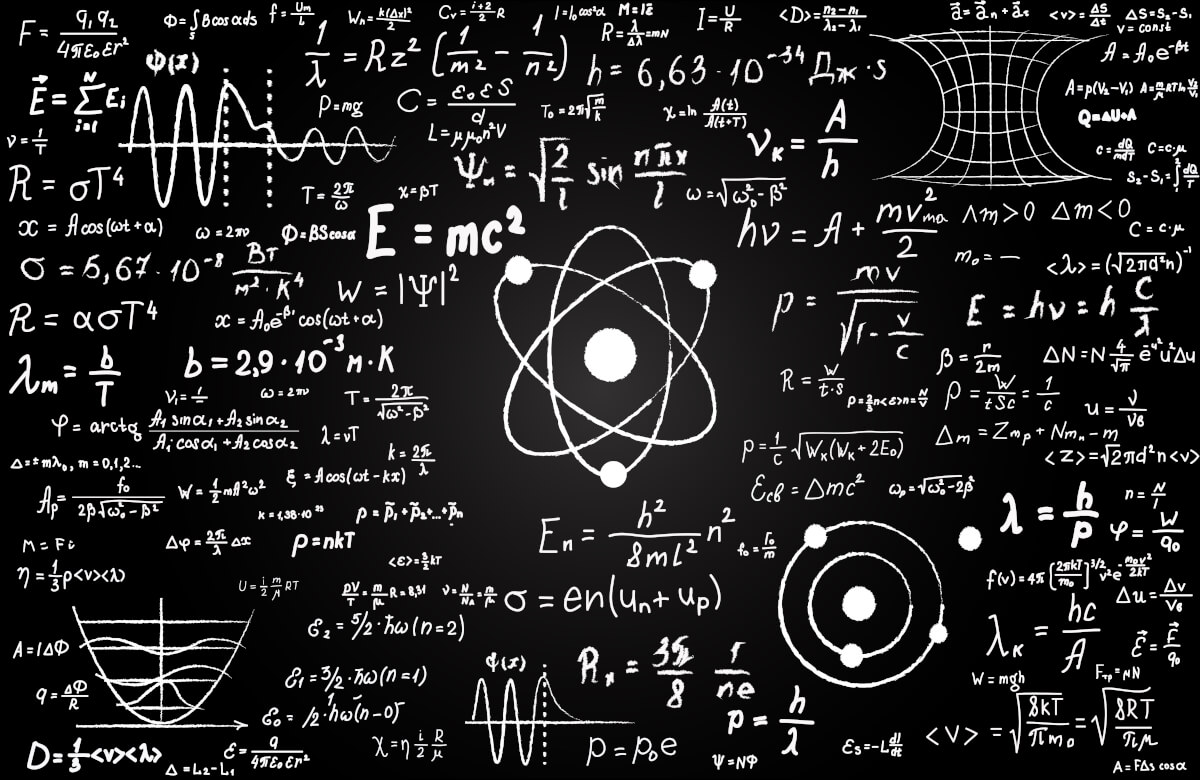Human behavior is an enigma that fascinates many scientists. And there has been much discussion over the role of probability in explaining how our minds work. Probability is a mathematical framework designed to tell us how likely an event is to occur – and works well for many everyday situations. For example, it describes the outcome of a coin toss as ½ – or 50% – because throwing either heads or tails is equally probable. Yet research has shown that human behavior can’t be fully captured by these traditional or “classical” laws of probability. Could it instead be explained by the way probability works in the more mysterious world of quantum mechanics?
Mathematical probability is also a vital component of quantum mechanics, the branch of physics that describes how nature behaves at the scale of atoms or sub-atomic particles. However, as we’ll see, in the quantum world, probabilities follow very different rules.
Discoveries over the last two decades have shed light on a crucial role for “quantumness” in human cognition – how the human brain processes information to acquire knowledge or understanding. These findings also have potential implications for the development of artificial intelligence (AI).
Human ‘irrationality’
Nobel laureate Daniel Kahnemann and other cognitive scientists have carried out work on what they describe as the “irrationality” of human behavior. When behavioral patterns do not strictly follow the rules of classical probability theory from a mathematical perspective, they are deemed “irrational.”
For example, a study found that a majority of students who have passed an end-of-term exam favor going on holiday afterward. Likewise, a majority of those who have failed also want to go for a holiday. If a student doesn’t know their result, classical probability would predict that they would opt for the holiday because it is the preferred option whether they have passed or failed. Yet in the experiment, a majority of students preferred not to go on holiday if they didn’t know how they’d done.
Intuitively, it’s not hard to understand that students might not want to go on holiday if they are going to be worrying about their exam results the whole time. But classical probability does not accurately capture the behavior, so it is described as irrational. Many similar violations of classical probability rules have been observed in cognitive science.
Quantum brain?
In classical probability, when a sequence of questions is asked, then the answers do not depend on the order in which the questions are posed. By contrast, in quantum physics, the answers to a series of questions can depend crucially on the order in which they are asked.
One example is the measurement of the spin of an electron in two different directions. If you first measure the spin in the horizontal direction and then in the vertical direction, you will get one outcome.
The outcomes will generally be different when the order is reversed, because of a well known feature of quantum mechanics. Simply measuring a property of a quantum system can affect the thing that’s being measured (in this case an electron’s spin) and hence the outcome of any subsequent experiments.

Order dependence can also be seen in human behavior. For example, in a study published 20 years ago about the effects that question order has on respondents’ answers, subjects were asked whether they thought the previous U.S. president, Bill Clinton, was honest. They were then asked if his vice president, Al Gore, seemed honest. When the questions were delivered in this order, a respective 50% and 60% of respondents answered that they were honest. But when the researchers asked respondents about Gore first and then Clinton, a respective 68% and 60% responded that they were honest.
On an everyday level, it might seem that human behavior is not consistent because it often violates the rules of classical probability theory. However, this behavior does appear to fit with the way probability works in quantum mechanics.
Observations of this kind have led cognitive scientist Jerome Busemeyer and many others to recognize that quantum mechanics can, on the whole, explain human behavior in a more consistent way. Based on this astonishing hypothesis, a new research field called “quantum cognition” has arisen within the area of cognitive sciences.
How it is possible that thought processes are dictated by quantum rules? Is our brain working like a quantum computer? No one yet knows the answers, but the empirical data strongly appears to suggest that our thoughts follow quantum rules.
Dynamic behavior
In parallel to these exciting developments, over the past two decades my collaborators and I have developed a framework for modeling – or simulating – the dynamics of people’s cognitive behavior as they digest “noisy” (that is, imperfect) information from the outside world.
We again found that mathematical techniques developed for modeling the quantum world could be applied to modelling how the human brain processes noisy data.
These principles can be applied to other behavior in biology, beyond just the brain. Green plants, for example, have the remarkable ability to extract and analyse chemical and other information from their environments and to adapt to changes.
My rough estimate, based on a recent experiment on common bean plants, suggests that they can process this external information more efficiently than the best computer we have today.
In this context, efficiency means that the plant is consistently able to reduce the uncertainty about its external environment to the greatest extent possible in its circumstances. This could, for example, encompass easily detecting the direction that light is coming from, so that the plant can grow towards it. The efficient processing of information by an organism is also linked to saving energy, which is important for its survival.
Similar rules may apply to the human brain, particularly to how our state of mind changes when detecting outside signals. All of this is important for the current trajectory of technological development. If our behavior is best described by the way probability works in quantum mechanics, then to accurately replicate human behavior in machines, AI systems should probably follow quantum rules, not classical ones.
I’ve called this idea artificial quantum intelligence (AQI). A great deal of research is needed to develop practical applications from such an idea.
But an AQI could help get us to the goal of AI systems that behave more like a real person.![]()
Article written by Dorje C. Brody, Professor of Mathematics, University of Surrey
This article is republished from The Conversation under a Creative Commons license. Read the original article.

THE ARGUMENT: Human behavior is an enigma that fascinates many scientists. And there has been much discussion over the role of probability in explaining how our minds work. Probability is a mathematical framework designed to tell us how likely an event is to occur – and works well for many everyday situations. For example, it describes the outcome of a coin toss as ½ – or 50% – because throwing either heads or tails is equally probable [Uh oh: Coin flips don’t truly have a 50/50 chance of being heads or tails
Researchers who flipped coins 350,757 times have confirmed that the chance of landing the coin the same way up as it started is around 51 per cent. https://lnkd.in/ewazRGDx%5D. Yet research has it that human behavior can’t be fully captured by these traditional or “classical” laws of probability. Could it instead be explained by the way probability works in the more mysterious [???] world of quantum mechanics?
THE COUNTER ARGUMENT: A proposed experiment for the quantum physicists of human behavior.
It should now or soon be possible to do this experiment with brains created in the laboratory. We might not be able to create brains that are complex enough for the experiment. In that case, we can carry out the experiment in a computer simulation or a paper and pencil mathematical model. If I can imagine how to do this, the quantum physicists should have no trouble. Or leave it to a thought experiment. In brief, create an Earth-like environment or world and populate it with brains. Not people, not social groups, just brains. Press “GO.” Watch what happens. You will not get human behavior.
Some questions: Is “explaining human behavior” the same process as “explaining how our minds work?” Is the fact that you model something the same thing as explaining that something? What assumptions have to be in place to make the leap from human behavior to mathematical probability models or vice versa and what is the rationale for those assumptions (research principle: chercher les rationales). Is quantum physics addressing human behavior as understood within the basic psychological paradigm? [HINT:YES]. In that case, is it based on the myth of individualism and the myth of a brain independent of the body, society, and the world? What do quantum physicists have to say about the scientific propositional sociology of Randall Collins? (Conflict Sociology, 1975; The Sociology of Philosophies, 1998?). Why don’t quantum physicists engage with sociology? Is it because they assume free will and agency and that drives their science? But what if as I claim the introspective transparency of free will and agency is an illusion? Oh, and what are those “secrets of human behavior” that have the quantum physicists’ baffled? The sociologists probably aren’t as baffled because human behavior has been their proper subject matter, systematically pursued since the 1840s.
two completely unrelated issues!!!…..they are only possibly somewhat connected at the sub atomic level…..which is in NO way a determinator of human behavior!!!……Werner Heisenberg is rolling over in his grave….please……leave quantum mechanics to the physical chemists!!………